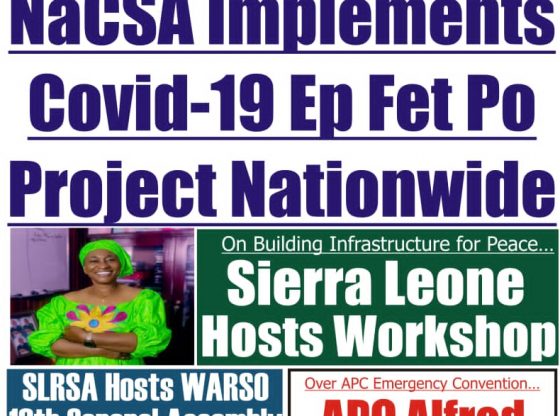The 2-day Regional Policy Workshop on Challenges, Opportunities and Best Practices in Building Infrastructures for Peace commenced at the Bintumani Hotel on Tuesday 5th October 2012.
The workshop, organized by the Kofi Annan International Peacekeeping Training Center (KAIPTC0) and sponsored by the Ministry of Foreign Affairs of Denmark, attracted over 40 participants from Ghana, Ivory Coast, The Gambia, Sierra Leone and Guinea.
In his welcome statement, the Governance Adviser to the President, Dr. Emmanuel Gaima commended the organizers for choosing Sierra Leone for the workshop, underscored the timeliness of the event, that there would be no development without peace that is fundamental to all other aspects, that peace should be treasured and harnessed and called on participants to address threats to peace that are fundamental to the sub-region.
He continued that local peace builders should respond to local situations, recalled that Sierra Leone did not experience peace for over 10 years that resulted to a hosts of diplomatic overtures leading to the signing of the Lome Peace Accord, that Sierra Leone is now having a nascent infrastructure with a legislature to have a National Infrastructure for Peace- the National Peace Commission.
The Danish Ambassador to Ghana, Liberia, Sierra Leone, Ivory Coast, Guinea and Togo, Mr. Tom Norring, who addressed the workshop via zoom, observed that his government’s cooperation with Ghana has yielded dividends resulting to the reduction in election violence and enhanced national peace infrastructure, underscored that securing peace is highly valuable and commended KAIPTC for the great work it is playing as an essential part in peacekeeping, wished participants all the best and hope that they would replicate the knowledge gained in their respective countries.
He also mentioned emerging issues like climate change asserting that we must give hope to people in need, that supporting peace is key for which Denmark has supported the West Africa Network for Peace Building (WANEP) since 2009 and commended all for working hard to put early warning mechanisms in place.
In her goodwill message, the Head of Mediation and Coordination of Regional Political Affairs, ECOWAS Commission, Dr. Onyinye Onwuka, revealed that Denmark supports the KAIPTC, that the event is rapt due to the emerging issues in the region, informed that for the past two years ECOWAS has been working on conflict prevention as well as developing national peace infrastructure for early warning and response in member states and highlighted incidents of election violence and recently the coup in Guinea.
However, she said she is confident the workshop would come up with important strategies to develop the infrastructure for peace.
In his keynote address, Dr. Mohamed Iba Chambers, who also addressed the workshop via zoom, asserted that he appreciates the mix of expertise at the workshop, that the event is extremely pertinent and timely when the security landscape in West Africa is undergoing transformation for which an intervention is being mobilized to prevent and respond timely to conflicts that have been worsened by the COVID-19 pandemic.
He further articulated that in spite of the great strides to consolidate peace in the sub-region, many states are grappling with threats that undermine peace and security citing drugs, maritime insecurity, the unequal international political economy that does not favor Africa, human trafficking, poor land administration, election violence, bad administration and corruption, youth unemployment, limited opportunities for job creation, violent extremist activities that have been intensified by deadly attacks and now military intervention in some states like Mali and Guinea all of which are sources of instability disclosing that marginalization and discrimination are also factors and fertile ground for radicalization and military coups.
According to Dr. Mohamed Iba Chambers, 90% of conflicts in Africa is resolved by traditional authorities, pointed out that mediation requires expertise and called for adequate and sustainable funding to effectively carryout peace building mandates adding that ECOWAS has 30 years of intervention in the sub-region but that its interventions have not always been successful.
Other issues highlighted by participants were that the Africa peace architecture is poorly resourced, both in terms of funding and manpower, that most threats to peace come from poor governance structures, that 60 Member States of the United Nations have contributed to the PeaceBuilding Fund (PBF) from which Sierra Leone has also benefited, that countries must translate early warning signs into early action and that the role of traditional and religious leaders must be heightened.
Dr. Isata Mahoi of WANEP moderated the session on Early Warning in the Context of Reconciliation and Democratic Elections in which the presenter revealed that The Gambia elections would take place in the coming weeks, that the early warning signs are very visible but lamented that response in the major challenge.
She furthered that 200,000 Gambians would be disenfranchised due to the lack of logistics to register and for them to vote.
Madam Isata Fall from The Ivory Coast presented a paper on Women, Peace and Security while the representative from Ghana gave a background to the formation of the Ghana Peace Council to harmonize and coordinate all conflict prevention and management as well as build sustainable peace in Ghana pointing out that most members of the Council are drawn from faith-based organizations, underscored the country’s religious tolerance and that the Council organizes trainings for political parties before elections.
The Commandant of KAIPKC, Major General Francis Ofori and Mr. Francis L. Kailie of the Office of National Security, Sierra Leone, also presented papers.
Highlights of the workshop were the plenary, question and answer sessions while the moderator was Rosemond Ebi-Adwo Aryeetey, Head of Corporate Affairs, KAIPTC.


